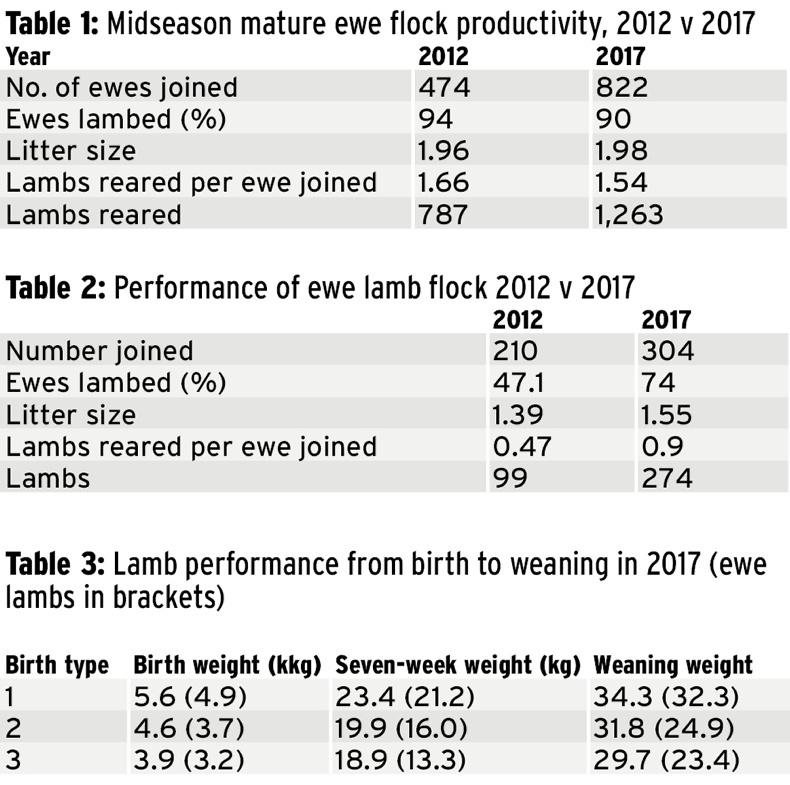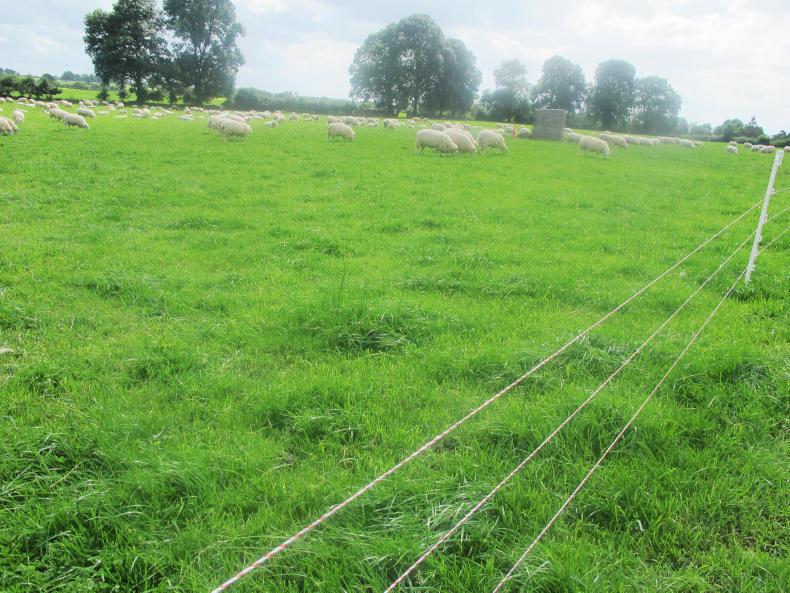Brian Nicholson hosted his last farm walk in Johnstown, Co Kilkenny, as part of the Teagasc BETTER farm sheep programme on Wednesday. Those gathered were given a chance to see how much the farm has changed over six years in the programme and future plans for Brian’s 1,000-plus ewe/ewe lamb flock.
When Brian joined the programme in 2012, he was lambing just over 470 ewes and reared 787 lambs. Five years on, he lambs 822 mature ewes and has also witnessed a doubling in productivity from his ewe lamb flock, which totalled 304 head joined to the ram in 2016.
The increase in output has been central to increasing the 96ha farm’s gross margin. Tables 1 and 2 detail performance of both the mature ewe flock and yearling flock. The percentage of ewes lambed is lower in 2017 but it must be noted that Brian is partaking in Sheep Ireland’s central progeny test (CPT), which meant that in autumn 2016, 600 of his ewes were artificially inseminated to 18 different rams from around the country. Mature ewes that lambed reared 1.7 lambs per ewe.
The farm’s gross margin has increased from €295/ha at the start of the programme to €869/ha in 2016, which means the farm is generating a massive return of just over €55,000 extra. Brian is hoping to continue to drive on performance and achieve the aim of reaching €1,000/ha in 2017.
In transforming his system, Brian focused on three main areas – his breeding policy, grassland management and flock management.
Breeding policy
In order to minimise incidents of disease risk, Brian has moved to a closed flock and now breeds all his own replacements. However, when selecting ewe lambs to enter the breeding flock, Brian implements a clear set of criteria in order to develop the type of flock he wants – a prolific flock with high genetic merit.
Brian mates ewe lambs at six months of age, but only if they are 45kg at the time of breeding. These lambs must come from high genetic merit sires as well as prolific dams.
They will be bred to easy lambing Charollais, Vendéen and Île de France rams, as no progeny will be kept for replacements from the ewe lamb flock.
His breeding programme has focused on developing a maternal/terminal reciprocal cross in his mature ewe flock. Texel ewes are crossed with Belclare rams, while Belclare ewes are crossed with Texel rams.
As mentioned previously Brian is also part of Sheep Ireland’s central progeny test (CPT), which collects extensive production data and feeds back into genetic evaluations to build accuracy levels for €uro-Star indexes.
Grassland and flock management
With the increased number of ewes and lambs on the farm, Brian has had to significantly increase grassland output. This has been achieved through a combination of increasing the number of permanent divisions from 26 to 38 and utilising temporary electric fencing to further increase control of grass and improve utilisation.
A reseeding programme has also significantly improved sward performance, as has addressing soil fertility deficits. The farm grew 13t DM/ha in 2016 with a fertiliser application of 110kg N. The high grass growth rates have also provided an opportunity to operate a contract rearing enterprise with 60 heifers grazed from June to the end of autumn or until grass runs out.
Ewes and lambs are grazed in a leader-follower system once weaned, with lambs moving ahead of ewes. Table 3 details lamb performance from birth to weaning.
There have been 400 lambs drafted as replacements initially with 100 of these sold as replacements at a later date. Some 3.6ha of Redstart has also been sown as an aid for finishing lambs with lambs weighing 36kg to 39kg transferred on to the crop three weeks ago.
Flock management
In order to manage his flock better around times such as lambing and drafting, Brian has also built a new sheep housing unit as well as designing an easy-to-use handling facility. This has been crucial in minimising the labour input in running such a large number of ewes.
When asked to sum up his overall experience in the BETTER farm programme, Brian said: “It’s been a hugely enjoyable experience, I’ve had first-hand access to advisers in Athenry and that has been key in driving the farm on.”







 This is a subscriber-only article
This is a subscriber-only article














SHARING OPTIONS: